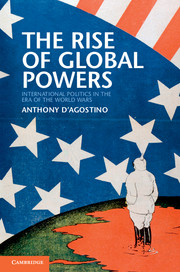Book contents
- Frontmatter
- Contents
- Maps
- Acknowledgements
- Introduction
- 1 The great powers at the dawn of world politics
- 2 Global origins of World War I: from the China scramble to the world crisis of 1904–1906
- 3 Global origins of World War I: a chain of revolutionary events across the world island
- 4 Balance and revolution, 1914–1918
- 5 A ragged peace, 1919
- 6 Scramble for Eurasia, 1919–1922
- 7 Drastic acts of unhappy powers, 1922–1923
- 8 Storms in the lull, 1924–1927
- 9 Politics and economics of the great slump, 1928–1933
- 10 A vogue for national economy
- 11 Mussolini’s moment, 1933–1935
- 12 The global civil war, 1936–1937
- 13 Last years of peace, 1937–1939
- 14 The European war, 1939–1941
- 15 The world war
- 16 Balance and hegemony
- Maps
- Notes
- Index
6 - Scramble for Eurasia, 1919–1922
Published online by Cambridge University Press: 05 June 2012
- Frontmatter
- Contents
- Maps
- Acknowledgements
- Introduction
- 1 The great powers at the dawn of world politics
- 2 Global origins of World War I: from the China scramble to the world crisis of 1904–1906
- 3 Global origins of World War I: a chain of revolutionary events across the world island
- 4 Balance and revolution, 1914–1918
- 5 A ragged peace, 1919
- 6 Scramble for Eurasia, 1919–1922
- 7 Drastic acts of unhappy powers, 1922–1923
- 8 Storms in the lull, 1924–1927
- 9 Politics and economics of the great slump, 1928–1933
- 10 A vogue for national economy
- 11 Mussolini’s moment, 1933–1935
- 12 The global civil war, 1936–1937
- 13 Last years of peace, 1937–1939
- 14 The European war, 1939–1941
- 15 The world war
- 16 Balance and hegemony
- Maps
- Notes
- Index
Summary
The peace could not be fully concluded in 1919. There were still revolutions in process in Central Europe. The civil war and Allied intervention in Russia had not come to a close. War raged in Turkey. Japan’s troops were in control of Siberia up to Lake Baikal and seemed destined to overawe China. The peace was in effect shaping up as an ineffectual scramble among the victors for mastery of Eurasia, a scramble bearing more than a slight resemblance to the scramble for Africa and the near-scramble for China that had preceded the war. The Eurasian scramble had four theaters, Europe, Russia, the Middle East, and the Far East. Events in one theater had a crucial effect on decisions in another. As we have seen, the failure of the British and French to establish the Whites in control of Russia meant that Poland was allowed to extend its power into Lithuania, White Ruthenia, and Ukraine, where it established a base for future claims to great power status and the potential leadership of a “third Europe.” The British, having lost in Russia, could not get a foothold at the Straits, in the Caucasus, or in Central Asia, and moreover had to deal with the opposition of a resurgent Soviet Russia to their attempts to hold on to gains won at the expense of the Ottoman Empire. When the Reds won in Russia, Japan’s cause in Siberia and China was weakened considerably, and the United States’ possibility of containing Japan greatly strengthened. Had it been different, had the Bolsheviks been defeated and Russia partitioned among the powers occupying its territory, the United States might have been the biggest loser, with Russia and China, which were to be its allies in World War II, reduced to the status of “sick men.”
British and French antagonism in the Middle East spilled over into attitudes on the European settlement, particularly strengthening the inclination of the British to look to Germany as a possible European balance to French power. The growth of a revisionist tendency in British opinion may have been inevitable in any event. Regret for the staggering and disheartening losses on the western front prompted a rosy retrospective appreciation of the pre-war Europe that was seemingly destroyed. It was in the cards that Britain would come to regret the diplomatic revolution that had made it the foe of Germany. But all this was sharpened to a much greater degree by the continuing tension with France that loomed up as a permanent feature of the new world situation.
- Type
- Chapter
- Information
- The Rise of Global PowersInternational Politics in the Era of the World Wars, pp. 144 - 161Publisher: Cambridge University PressPrint publication year: 2011



